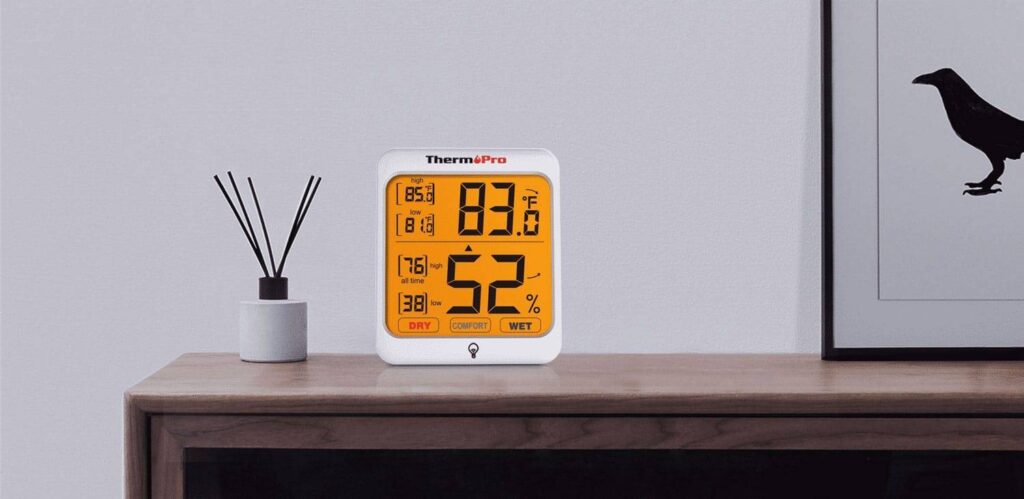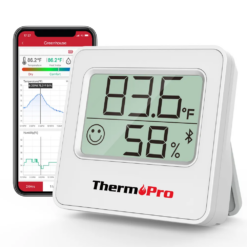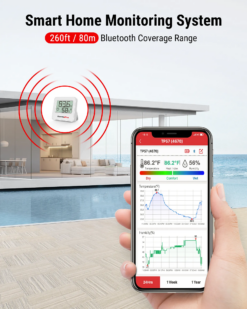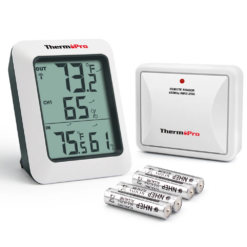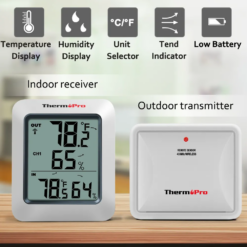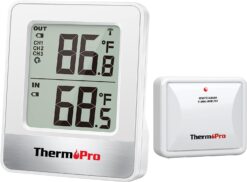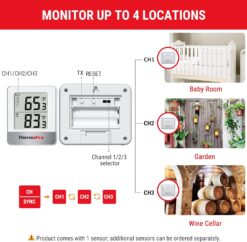Cold rooms play a crucial role in preserving the quality and freshness of perishable products in industries such as food, pharmaceuticals, and agriculture. Maintaining the right temperature and humidity levels is essential to prevent spoilage, contamination, and other humidity-related issues. Hygrometers, which measure humidity, are indispensable in ensuring that cold rooms remain in optimal condition.
In this article, we will explore the importance of hygrometers in cold rooms and how they contribute to maintaining ideal conditions for various industries in Kenya.
Why Is Humidity Control Critical in Cold Rooms?
Cold rooms are designed to preserve perishable goods, but humidity control is just as important as temperature regulation. If humidity levels rise too high, condensation can form on products, leading to mold, mildew, and spoilage. On the other hand, if humidity levels are too low, certain goods, such as fruits, vegetables, and certain pharmaceuticals, may dry out, losing their quality and value.
By regularly monitoring and controlling humidity levels with a reliable hygrometer, businesses can prevent these issues, ensuring products remain in peak condition for the duration of their storage.
How Hygrometers Maintain Optimal Cold Room Conditions
Hygrometers provide accurate, real-time data on humidity levels, allowing cold room managers to monitor and maintain ideal storage conditions. In a Kenyan business context, where fluctuating temperatures and varying environmental conditions are common, hygrometers help businesses avoid losses by ensuring their cold rooms function at optimal efficiency.
The following key benefits highlight the role of hygrometers in cold rooms:
1. Preventing Product Spoilage
High humidity can lead to condensation on stored products, particularly in the food and agricultural sectors. This moisture promotes the growth of mold and mildew, rendering products unsuitable for sale. Hygrometers like the ThermoPro TP60C and ThermoPro TP200B, which are waterproof, help cold room operators keep an eye on humidity levels and take action before they reach critical levels that could cause spoilage.
2. Ensuring Regulatory Compliance
In the pharmaceutical industry, maintaining strict environmental conditions is required by law to ensure the safety and efficacy of stored drugs and vaccines. Hygrometers help businesses comply with regulatory standards by providing continuous monitoring of humidity and temperature levels. The ThermoPro TP90, a WiFi-enabled hygrometer, allows for remote monitoring of cold rooms, ensuring that any fluctuations can be immediately addressed, reducing the risk of non-compliance and penalties.
3. Reducing Energy Costs
Hygrometers provide accurate data that helps in adjusting cold room HVAC systems only when needed. Without precise data, operators may overuse dehumidifiers or air conditioning units, leading to unnecessary energy consumption. Smart hygrometers, such as the ThermoPro TP90, transmit real-time data via WiFi, enabling operators to optimize the use of these systems and reduce energy costs.
Use Cases: How Hygrometers Are Beneficial in Kenyan Cold Rooms
1. Agricultural Storage
Kenya’s agricultural sector relies heavily on cold rooms to store produce like fruits, vegetables, and flowers. Maintaining the right humidity levels ensures that these perishable goods stay fresh for extended periods. For instance, too much moisture can cause fruits to rot or flowers to wilt. A device like the ThermoPro TP60C, which is both waterproof and accurate, ensures that moisture levels remain in the ideal range for preserving these sensitive goods.
Example: A flower export company in Naivasha uses smart hygrometers to monitor the humidity in its cold storage. By keeping humidity levels at an optimal level, they extend the shelf life of their flowers, reducing spoilage and ensuring high-quality exports.
2. Pharmaceutical Cold Storage
Pharmaceuticals require strict environmental control, particularly when it comes to vaccines, insulin, and other temperature-sensitive drugs. Any fluctuation in humidity can affect the efficacy of these products. Smart hygrometers, such as the ThermoPro TP90, allow pharmaceutical companies to track humidity remotely, alerting them to any deviations that could compromise product safety.
Example: A Nairobi-based pharmaceutical company uses WiFi-enabled hygrometers to monitor its cold rooms. If humidity rises above the set threshold, the hygrometer sends an alert to the warehouse manager’s smartphone, enabling them to take corrective action immediately. This ensures the integrity of their stock and prevents costly spoilage.
3. Food Storage and Distribution
Cold rooms in the food industry are essential for preserving the quality of meats, dairy, and other perishables. Maintaining the right humidity is just as important as temperature in these environments. Excessive humidity can cause condensation on meat products, leading to bacterial growth. A reliable hygrometer like the ThermoPro TP200B, with its waterproof sensor, helps food distribution companies maintain the ideal conditions for their products.
Example: A meat processing plant in Nairobi uses the ThermoPro TP200B to monitor humidity in their cold rooms. By keeping humidity in check, they prevent moisture buildup that could lead to bacterial contamination, ensuring the safety and quality of their products.
Indoor Thermometer
ThermoPro TP200B: Waterproof Thermometer – Outdoor & Indoor Thermometer
Advantages of Smart Hygrometers for Cold Rooms
Smart hygrometers, which connect via Bluetooth or WiFi, offer significant advantages for businesses that rely on cold storage. Some of the key benefits include:
- Remote Monitoring: Smart hygrometers like the ThermoPro TP90 and ThermoPro TP357 allow operators to monitor humidity levels from their smartphones or computers. This is especially useful for businesses with multiple cold rooms or facilities, as operators can oversee all environments from a central location, reducing the need for manual checks.
- Data Logging: Many smart hygrometers provide historical data logging, allowing businesses to analyze past humidity conditions. This information can be used to optimize HVAC system performance and prevent future issues, leading to long-term cost savings.
- Alerts and Notifications: WiFi and Bluetooth-enabled hygrometers send instant alerts if humidity levels exceed a preset threshold. This allows operators to take immediate action, reducing the risk of product damage or regulatory non-compliance.
Maintaining optimal humidity levels in cold rooms is critical for preserving perishable goods, reducing costs, and ensuring regulatory compliance. Hygrometers provide businesses with the tools they need to monitor and control humidity effectively, preventing costly spoilage and ensuring that products remain in top condition.
By using smart hygrometers like the ThermoPro TP60C, TP200B, and TP90, businesses in Kenya can enjoy the benefits of real-time monitoring, remote access, and data logging, all of which contribute to efficient cold room management. Investing in these devices can save businesses money by reducing energy costs, preventing product losses, and ensuring regulatory compliance in the long term.

